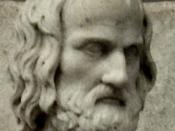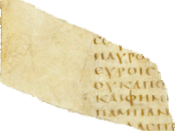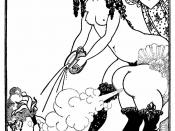In this paper I will demonstrate why I believe, contrary to widespread opinion and possible even his own, that Aristophanes, not Euripides, was, of the four major dramatists fo Athens' Golden Age, the one who least respected women.
Having become aware at the ouset of this leterrature course of the position of women in the otherwise enlightened thought of Greece in the Fifth Century B.C., I kept my eyes open during our reading for evidences of, if I may comit an anchronism, chauvinism in the plays of Aeschylus, Sophocles and Euripides. Consoled by the knoledge presented in the text that Aristophanes had accused Euripides of hating women. I didn't look for it in Lysistrata. Nevertheless, that is where I found it.
In interpreting attitudes toward women in the dramas, I accepts certain prevailing tradtions as given and tried to give the playwrights the benefit of the doubt, turning my head at such practices as using only male actors in the plays and leaving the women in the kitchen while attending the plays.
Having concedes those points, I set about "listening" to the playwrights.
In Agamemnon, Aeschylus addresses some remarks toward his Clytaemnestra which could possibly be interpreted as disparaging. She is said to "maneuver like a man," and Cassandra exclaims, "What outrage--the woman kills the man!" The chorus asks her "What drove her insane" enough to kill a man. Her lover, Aegisthus, although he gloats over the body he cringed from cutting down, allows that "the treachery was the woman's work, clearly." Far from denigrating women, however, I believe these parrotings of the prevailing attitudes, when juxtaposed with Aeschylus' portrayal of an intelligent, capable Clytaemnestra, a gullible, ususpecting Agamemnon and a spineless, parasitical Aegisthus, achieve the result of satirizing those attitudes. At the close of the play,


